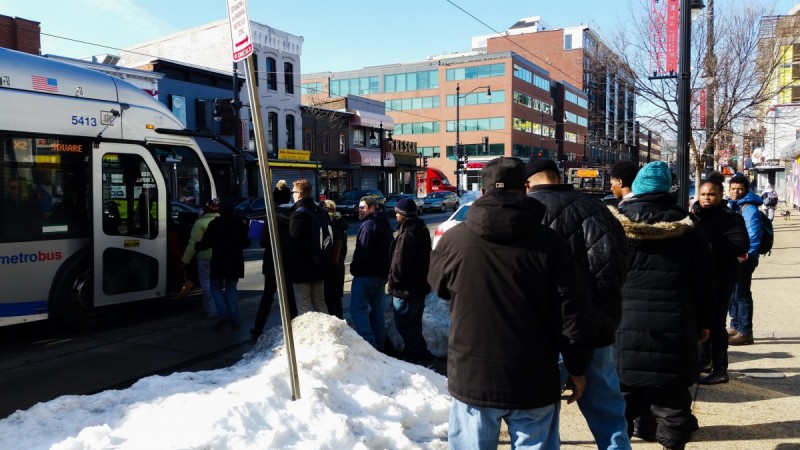Nobody gets thrown in jail for not paying a highway toll or a parking meter. But for some reason people who break transit fare rules are subject to criminal penalties.
In Washington, DC, jumping a turnstile is punishable by a fine of up to $300 and up to 10 days in jail. A bill in the City Council would make these penalties much less severe, treating fare evasion as a civil violation instead of a crime. It has majority support in the council, but WMATA is resisting.
Now the push for decriminalization in DC is gaining momentum, reports Eve Zhurbinskiy at Greater Greater Washington. The Save Our System Coalition -- composed of transit unions, the local Black Lives Matter chapter, and other activists -- is drawing attention to the use of excessive force and racial profiling by police enforcing transit fares.
A recent case in which officers brutalized a black woman boarding a bus with her two young children has raised the pressure on elected officials to act, Zhurbinskiy writes:
Metro Transit Police fare evasion enforcement tactics have recently drawn even more scrutiny, following the arrest of a 20-year-old woman at a bus stop off of Alabama Ave Southeast earlier this month. The woman, a student at Ballou STAY High School, had boarded the W4 bus with her 1-year-old son and 2-year-old daughter. She had a DC One card which allowed her to ride for free, but it was not with her on the day of the arrest.
She suffered 12 stitches in her knee, a busted face including injuries around her mouth and four broken teeth, and a fractured knee after a Metro Transit Police officer slammed her face to the ground and arrested her for fare evasion and resisting arrest. The case has been cited by Save Our System as an example of why Metro fare evasion policies need to be reformed.
The chief sticking point is WMATA, which has turned to stricter fare enforcement as it struggles with intense budget pressures. The agency estimates that failure to pay the fare costs $25 million in foregone revenue annually, and it doubled the rate of citations for fare evasion in 2017.
In pursuing this approach, WMATA is becoming more of an outlier among American transit agencies. In other big cities, transit agencies are reconsidering harsh fare enforcement regimes that criminalize disadvantaged people and exacerbate systemic social inequities.
California no longer treats fare evasion by minors as a crime. King County, which encompasses Seattle, has done the same. San Francisco decriminalized fare evasion for everyone back in 2008. Portland and Cleveland have also mostly decriminalized fare evasion -- except for repeat offenders.
In the end, WMATA isn't even helping its own bottom line, because obsessing over strict fare enforcement slows down service and repels would-be riders. Transit experts recommend implementing convenient, proof-of-payment fare collection methods that speed up service, with non-punitive inspection systems. Make the fare system work better for riders, and more people will ride -- and pay fares.
Smashing your riders' teeth when they forget their fare cards, on the other hand, isn't a good way to encourage people to use your service.





